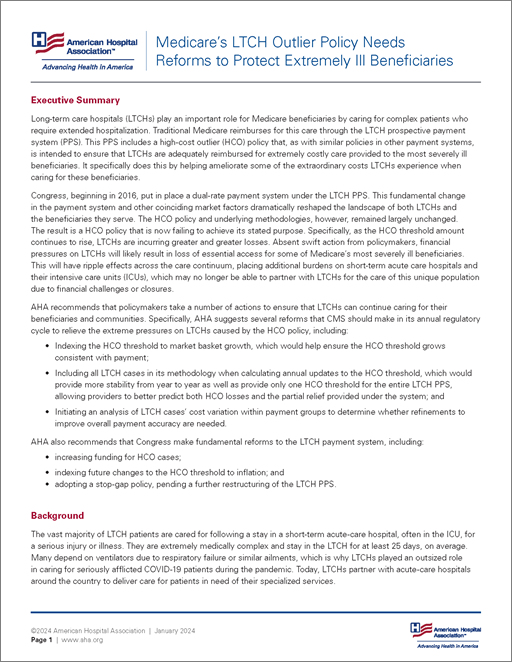

White Paper: Medicare’s LTCH Outlier Policy Needs Reforms to Protect Extremely Ill Beneficiaries
Originally published December 2023, updated January 2024.
Executive Summary
Long-term care hospitals (LTCHs) play an important role for Medicare beneficiaries by caring for complex patients who require extended hospitalization. Traditional Medicare reimburses for this care through the LTCH prospective payment system (PPS). This PPS includes a high-cost outlier (HCO) policy that, as with similar policies in other payment systems, is intended to ensure that LTCHs are adequately reimbursed for extremely costly care provided to the most severely ill beneficiaries. It specifically does this by helping ameliorate some of the extraordinary costs LTCHs experience when caring for these beneficiaries.
Congress, beginning in 2016, put in place a dual-rate payment system under the LTCH PPS. This fundamental change in the payment system and other coinciding market factors dramatically reshaped the landscape of both LTCHs and the beneficiaries they serve. The HCO policy and underlying methodologies, however, remained largely unchanged. The result is an HCO policy that is now failing to achieve its stated purpose. Specifically, as the fixed-loss amount for HCO cases continues to rise, LTCHs are incurring greater and greater losses. Absent swift action from policymakers, financial pressures on LTCHs will likely result in loss of essential access for some of Medicare’s most severely ill beneficiaries. This will have ripple effects across the care continuum, placing additional burdens on short-term acute care hospitals and their intensive care units (ICUs), which may no longer be able to partner with LTCHs for the care of this unique population due to financial challenges or closures.
AHA recommends that policymakers take a number of actions to ensure that LTCHs can continue caring for their beneficiaries and communities. Specifically, AHA suggests several reforms that CMS should make in its annual regulatory cycle to relieve the extreme pressures on LTCHs caused by the HCO policy, including:
- Indexing the fixed-loss amount to market basket growth, which would help ensure the fixed-loss amount grows consistent with payment;
- Including all LTCH cases in its methodology when calculating annual updates to the fixed-loss amount, which would provide more stability from year to year as well as provide only one fixed-loss amount for the entire LTCH PPS, allowing providers to better predict both HCO losses and the partial relief provided under the system; and
- Initiating an analysis of LTCH cases’ cost variation within payment groups to determine whether refinements to improve overall payment accuracy are needed.
AHA also recommends that Congress make fundamental reforms to the LTCH payment system, including:
- Increasing funding for HCO cases;
- Indexing future changes to the fixed-loss amount to inflation; and
- Adopting a stop-gap policy, pending a further restructuring of the LTCH PPS. Background
View the detailed white paper below.

